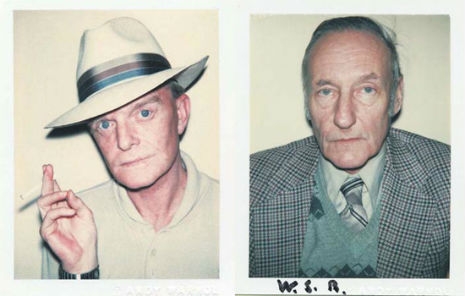
Polaroid portraits of Truman Capote and William s. Burrooughs shot by Andy Warhol
There is a fascinating, well-researched article by Thom Robinson over at the might Reality Studio blog devoted to all things William S. Burroughs. Robinson is a British PhD candidate who has extensively researched Burroughs.
After setting up the backstory with anecdotes involving the mutual distaste that Burroughs (who apparently disliked effeminate homosexuals) felt for Capote (who might have snubbed Burroughs with Tennessee Williams and Paul Bowles in Tangier), Robinson relates the tale of a “curse” Burroughs placed on Capote’s literary talents in the form of an extraordinarily spiteful two-page “Open Letter to Truman Capote,” a copy of which now resides in the Burroughs Archive of the New York Public Library’s Berg Collection:
Burroughs’ “letter” begins with an explanation to Capote that his “is not a fan letter in the usual sense.” Acting as spokesman for a “department” with apparent responsibility for determining writers’ fates, Burroughs announces that he has followed Capote’s “literary development from its inception” and, in the line of duty, has conducted exhaustive inquiries comparable to those undertaken by Capote in his research for In Cold Blood. An engagingly surreal touch finds Burroughs reporting that these inquiries have included interviewing all of Capote’s fictional characters “beginning with Miriam” (the title character of Capote’s breakthrough story of 1945). Referring to “the recent exchange of genialities” between Capote and Kenneth Tynan, Burroughs concludes that Tynan “was much too lenient.” Going one step further than Tynan and accusing Capote of acting as an apologist for hard-line methods of police interrogation (and thus supporting those “who are turning America into a police state”), Burroughs next turns to the question of Capote’s writing abilities. Avowing that Capote’s early short stories were “in some respects promising,” Burroughs suggests Capote could have made positive use of his talents, presumably by applying them to the expansion of human consciousness (“You were granted an area for psychic development”). Instead, Burroughs finds that Capote has sold out a talent “that is not yours to sell.” In retribution for having misused “the talent that was granted you by this department”, Burroughs starkly warns “That talent is now officially withdrawn,” signing off with the sinister admonition, “You will never have anything else. You will never write another sentence above the level of In Cold Blood. As a writer you are finished.”
It should be noted that, at the time of writing, Burroughs was a credulous believer in the efficacy of curses (famously believing he had successfully used tape recorders to close down a London restaurant where he had received bad service). Regardless of how seriously Burroughs intended his prediction for Capote’s future, his words proved eerily prescient. After the publication of In Cold Blood, Capote announced work on an epic novel entitled Answered Prayers, intended as a Proustian summation of the high society world to which he had enjoyed privileged access over the previous decades. The slim existing contents were eventually published posthumously while one of the few extracts which saw publication within Capote’s lifetime notoriously employed Capote’s habit of indiscretion to disastrous effect. When “La Côte Basque, 1965″ was published by Esquire in 1975, Capote’s betrayal of the confidences of friends (who recognized the identities lurking beneath the veneer of fictionalized characters) resulted in swift exile from the celebrity world which Capote had courted for much of his career.
Given Burroughs’ curse on Capote, it is interesting to note that, in the years before his death, Capote’s dismissive views on Burroughs’ work became even more damning: “Norman Mailer thinks William Burroughs is a genius, which I think is ludicrous beyond words. I don’t think William Burroughs has an ounce of talent.” By the time these remarks were recorded by Lawrence Grobel in Conversations with Capote, successful canvassing by Mailer among others had resulted in Burroughs’ admission to the American Academy and Institute of Arts and Letters in 1983. After a long decline, wrought by the inability to break a harrowing cycle of alcohol and barbiturate abuse, Capote died the following year at the age of 59.
In Cold Blood: William Burroughs’ Curse on Truman Capote (Reality Studio)
Thank you Celia Rimell